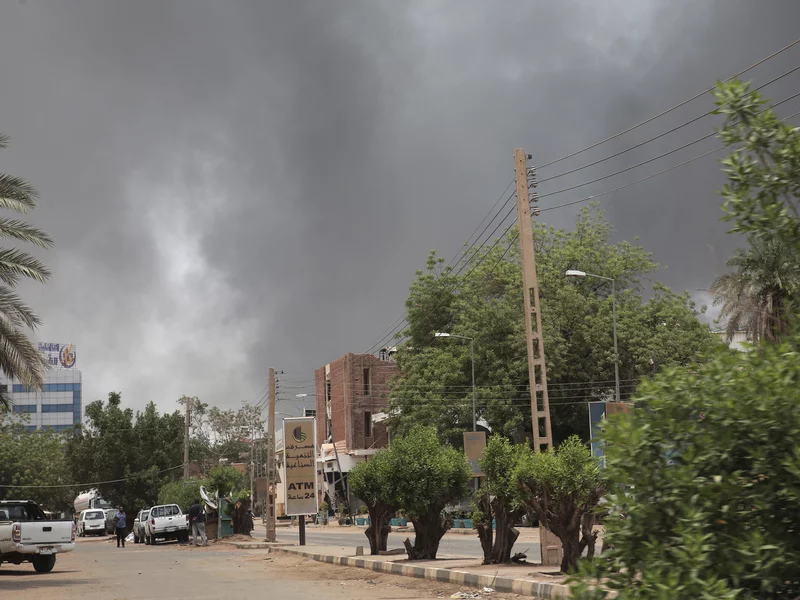Sudan has once again been thrown into turmoil as the country’s armed forces and the paramilitary Rapid Support Forces engaged in a deadly battle for control. The clashes have resulted in the loss of at least 25 lives, with many more injured and displaced.
According to eyewitnesses and reports from the region, the conflict erupted when members of the Rapid Support Forces, who are known for their brutal tactics and human rights abuses, attempted to take over several government buildings in the capital city of Khartoum. The Sudanese Armed Forces, which had recently undergone a restructuring and was still in the process of consolidating its power, responded swiftly, leading to a protracted gun battle that lasted for several hours.

As the fighting intensified, civilians in the affected areas forced to flee their homes, seeking shelter and safety wherever they could find it. The sound of gunfire and explosions could heard throughout the city, as people cowered in fear, unsure of what the future held.
Sudan has a long history of political instability and violence, with numerous armed groups vying for power and control. However, this latest round of fighting is particularly concerning given the fragile state of the country’s democracy and the potential for further escalation.
The government has condemned the violence and called for calm, urging all parties to engage in peaceful dialogue to resolve their differences. However, many fear that this latest outbreak of conflict could signal a return to the authoritarian rule that characterized Sudan’s past.
Air strikes reported in Khartoum’s sister city Omdurman
According to eyewitness accounts provided to Reuters, the Sudanese military has conducted airstrikes on a compound owned by the paramilitary Rapid Support Forces in the city of Omdurman. The accuracy of the military’s claim that it has seized all RSF bases in Omdurman could not be verified by WhatsOn at the time of reporting.
The city of Omdurman is in close proximity to the capital, Khartoum. Prior to the airstrikes, the Sudanese Doctors’ Union had reported that there were already four fatalities resulting from skirmishes within the city.
Amal Mohamed, a medical professional at a public hospital in Omdurman, has described the situation as one of “ubiquitous fire and explosions.”

Sudanese air force calls on citizens to stay indoors
On Saturday, the Sudanese air force requested that residents remain indoors while they carried out operations in regions under the control of the Rapid Support Forces (RSF). Fighter planes observed in the sky during this time.
The military reported that they conducted attacks using both planes and drones against RSF locations in Khartoum. Consequently, the Khartoum International Airport shut down, and prominent international airlines halted their flights to Sudan.
According to a Reuter’s witness, explosions could heard close to the airport late on Saturday.
Fighting in Sudan is ‘worst case’ scenario
According to Isma’il Kushkush, a journalist who witnessed the power struggle between the military and paramilitary forces in Sudan, the worst-case scenario of fighting between the two groups has occurred. This is a situation that the Sudanese people had hoped to avoid after the 2019 Sudanese Revolution, as they were expecting a transition to democracy.
The transition agreement made after the ousting of Omar al-Bashir involved both the military and the Rapid Support Forces (RSF), which raised issues such as justice and accountability, as well as removing the army and the RSF from the Sudanese economy. However, the major issue between the two groups was the question of command, specifically whether the RSF would fall under the direct command of the army.
While some in the Sudanese army were wary of the RSF’s power and lack of traditional military training, others believed that elements within the army still had ties to the old government. The transition process involved a lot of political maneuvering between the military, the RSF, and civilians.
Diplomats calls for end of hostilities and return to dialogue
The ongoing conflict has received widespread international condemnation, with various organizations including the United Nations, European Union, and African Union, urging an immediate end to hostilities. UN Secretary-General Antonio Guterres has personally appealed to the leaders involved in the conflict, urging a return to dialogue.
Top officials from the European Union, African Union Commission, and Arab League have all called for a cessation of hostilities and for both sides to engage in negotiations. In response to a request by Egypt and Saudi Arabia, the Arab League has scheduled an emergency meeting for Sunday to discuss the situation.
In a joint statement, foreign ministers from Saudi Arabia, the United States, and the United Arab Emirates stressed the importance of de-escalation, according to the Saudi Foreign Ministry.
The United Kingdom has called for an emergency session of the UN Security Council to take place on Monday, to address the ongoing conflict.
International organizations and humanitarian groups have also expressed their concern over the situation, with many calling for an immediate end to the violence and for the protection of civilians caught in the crossfire.
As the situation continues to unfold, the world watches with bated breath, hoping for a peaceful resolution to the conflict and an end to the suffering of the Sudanese people.














